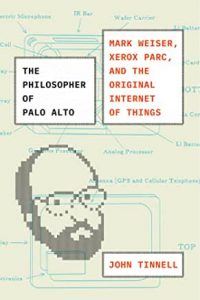The Philosopher of Palo Alto: Mark Weiser, Xerox PARC, and the original Internet of Things by John Tinnell is a really interesting read in the context of the latest developments in AI. I do have a boundless appetite for books about the history of the industry, and was intrigued by this as I’d never heard of Mark Weiser. The reason for that gap, even though he ran the computer science lab at Xerox PARC, is probably that his philosophy of computing lost out. In a nutshell, he was strongly opposed to tech whose smartness involved making people superfluous.
Based on his reading of philosophers from Heidegger and (Michael) Polanyi to Merleau-Ponty, Weiser opposed the Cartesian mind-body dualism involved in Turing’s (1950) paper and the subsequent development of late 20th century digital technologies focused on ‘machines that think’, electronic brains. He aimed to develop computing embedded in the environment to support humans in their activities, rather than computing via screens that aimed to bring the world to people but through a barrier of processing. In one talk, he gave the analogy of what makes words useful. Libraries gather many words in a central location and are of course very useful. But words that ‘disappear’ into the environment are also useful, like street signs and labelling on packages in the supermarket. Nobody would be able to shop efficiently if there were no words on the soup cans, and they had to go to a library to refer to a directory of shelf locations to find the tomato flavour.
Weiser emphasised also the role of the human body in knowledge and communication: “The human body, whatever form it took, was a medium not a machine.” In a dualist conception of mind and body it seems to be reasonable to think about a machine substituting for the activities of the mind. But the body’s senses are not information processors, and cannot be substituted by digital sensors. Embodied human experience in the world is part of human knowledge. Weiser became highly sceptical of the industry’s trajectory whereby software more and more “dictated what could and could not happen in a place.” Rather than mediating between the physical world and humans, tech should be looking to augment the material world in useful ways (hence the subtitle about the original Internet of Things).
Weiser died young, another possible reason why he is not better known. One can imagine though what he would have thought of generative AI. The book’s Introduction ends with a quote from Lewis Mumford: “The machine is just as much a creature of thought as the poem.” These AI products have been imagined as disembodied brains that get in the way of our direct experience of the world and indeed increasingly limit our ability to shape the world we want. A really interesting read, and one that will send me off to read other things – including the work of a PARC ethnographer who is really the second hero of this book, Lucy Suchman.

